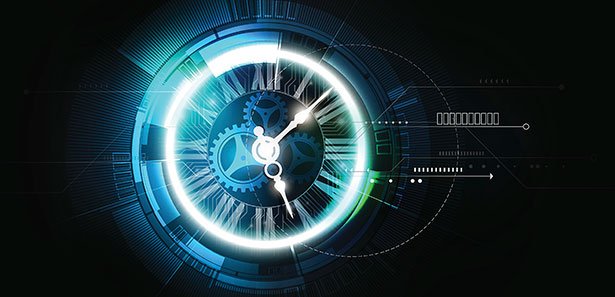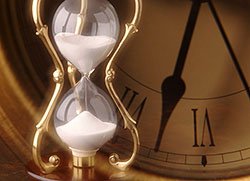Time and Entropy: Why time is not running backwards - Part 2

This is the second part of my "Time and Entropy" series. Why doesn't time run backwards? If you have missed the first one, don't miss to read it, which is about The size of Time. Enjoy!
Part 2: A circular argument?
The problem with clocks
The registration of irrevocably advancing time with clocks is trivial for us. But there is a problem with this: We use the temporal conformity of periodic processes to define time units - and can only be certain about provided equality in a result of time measurement.
This connections, but also the nature of time itself, have given reasons for a manifold of different views on it. Especially famous is the one of Stephen Hawking, who was discussing connections between the Big Bang and the beginning of time, whereas Albert Einstein made clear, that in two towards each other moving reference systems, time does not flow the same way. For Carl Friedrich von Weizsäcker it was important to find some substantiation of the phenomenon:
The fundamental structure of time is its objective progress.
Measuring unit and definition as well
Physics is very pragmatic about the problematic, defining clocks as basic definitions of time units that can be used as measuring units as well: A lot of periodic processes serve the mutual reference and as always in physics, its goal is an in itself logic system of terms, definitions and experimental results.
Galileo Galilei is known as the inventor of the so called experimental method, which got famous not only because of his free fall experiments. Following his thoughts, a falling movement is not dependent from its mass, as long as friction is not involved. He could show, that the speed of a falling sphere is proportional to time. If you know place and speed of the sphere at a specific moment, you can calculate the relevant sizes of later moments.
The hunt after the moment
In a lot of different use cases the behaviour of a system is calculated in time. So for physicists, time is very important, because we could say, that they somehow look into the future, but only under coordinated circumstances and with the possibility of experimental prove.
By measuring changes in time, we also try to capture the moment. By way of comparison it is much easier to say something about the average speed of a vehicle at a specific driving time. But how fast is a vehicle at a specific moment when it accelerates constantly, meaning that its speed is changing all the time? This is why the term instantaneous velocity was introduced which also contributed a lot to development of modern mathematics.
The direction of time

